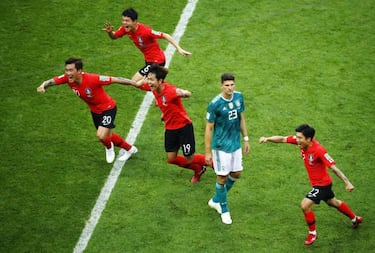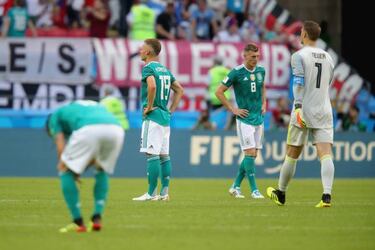Germany’s exit leaves a weaker Europe behind
I genuinely saw Germany as the favourites for this tournament, particularly because it is being played in Europe.
Imposing dependability gone awry
I genuinely saw Germany as the favourites for this tournament, particularly because it is being played in Europe. Very rarely do South American sides win in Europe, with the exception of Brazil in Sweden (in 1958 with Pelé), or European sides in the Americas, apart from Germany in Brazil (2014). In my global interests, there is a long-standing respect for Germany, with its imposing dependability, whether it be in a washing machine, car or football team. Therefore, to me Kroos’s 95th minute heroics against Sweden, curling the burl beautifully into the far corner, seemed perfectly normal. The surprise came against South Korea, where their struggles stuck out like a sore thumb, losing not 1-0 but 2-0 courtesy of Neuer’s foray up the pitch…

Europe affected
Related stories
When Germany slip up, the rest of Europe feels it – I’m not just talking about football here, but I’m not going to elaborate further. One thing is for Italy to be missing (a friend of mine used to say that the World Cup starts with Italy’s first game), but now we’re left with just France, England and Spain as the national sides bearing a star on their chest and set to come up against Brazil, Uruguay and Argentina. The fall of Germany is like a big brother dropping out and, in truth, it’s not undeserved, with the warning signs coming from Khedira's and Özil’s controversial meeting with Turkish president Erdogan, followed by Löw’s inability to revamp a side that was clearly torn and frayed.

Rising to the challenge
Germany limp away, but Brazil march on with their flashes of brilliance in attack and with Neymar, who is likely to grow into the tournament. Then there is Argentina and their upheavals in parallel with Maradona’s histrionics, with his cringeworthy sideshow running with the fate of Messi’s side. And finally Uruguay, a country with three million inhabitants and four stars (from the 1924 and 1928 Olympics and the 1930 and 1950 World Cups). As Latin America tightens its grip, one-time winners Spain, England and France will need to rise to the challenge.
